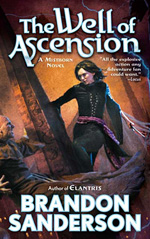
![]() verkisto
verkisto
7/26/2016
![]()
The Final Empire was a bit of a ho-hum fantasy story to me. It picked up in the end, taking the traditional fantasy tropes and turning them on their head, and ended with the suggestion that there was more -- much more -- to come in the series. The Well of Ascension picks up a year later, and gives us some of that much more.
Elend's city is struggling to maintain its independence after the events of The Final Empire, and when other armies move into the outskirts of the city in an attempt to take it for themselves, the tensions come to a head. A lot happens in this novel, and all of it comes from the setup that Sanderson created in the first book. As the story progresses, one might get the idea that Sanderson is reverting back to the usual fantasy tropes, but by the end of the book, they're all turned around again.
The Well of Ascension is the book that makes The Final Empire a better book, and elevates the series to something more than just a ho-hum fantasy story. For all that happened in The Final Empire, it ultimately serves as mere exposition for what happens next. And given the way that The Well of Ascension ended, I expect to think the same of it after I finish The Hero of Ages.
There is a lot of wisdom in this story. Sanderson has a strong understanding of government, society, politics, and character, and the story is about all of those things. Where The Final Empire was a lot of world-building, setup, and exposition, The Well of Ascension is a more complex story of how to rebuild a society once its despot is defeated and true government moves in. It's not as complex a story as A Song of Ice and Fire (in some ways, the story feels very simple compared to that of Martin's series), but it's definitely more than what occurred in the first book.
Much has been made in other reviews of how Vin and Elend's relationship is depicted, but I found it to be a little forced. I can see them as allies and friends, but seeing them as a couple is much harder to do. The most romance we see pass between the two of them is kisses and arms around each other; I don't think it's necessary to have any sex scenes to better portray that relationship, but it always felt more platonic than romantic to me. I was far more interested in the relationship between Vin and OreSeur, if for no other reason than the fact that there was a true arc to how that relationship developed. In this novel, Vin and Elend are considered a given after the first novel (which didn't develop that relationship convincingly enough, either, I should note), and what development of their relationship occurs in this novel didn't affect me that much.
There were a lot of "Try and"s scattered throughout this book, which was an annoyance. One doesn't "Try and" do something; they "Try to" do it. In addition, there were multiple occurrences of "the man that" instead of the "the man who", which were equally grating. I know this is fairly common usage, but for a professionally published novel, the grammar should be correct. This is a glaring editorial error, and every time I came across it, it took me out of the story (to say nothing of the "to" in place of "too" near the end of the book).
Overall, though, I'm impressed with the series. I don't think it's resonated with me as it has with other readers (judging by the number of five-star ratings and gushing reviews), but it's definitely been worthwhile. I'd recommend it to fans of fantasy who haven't read it yet.